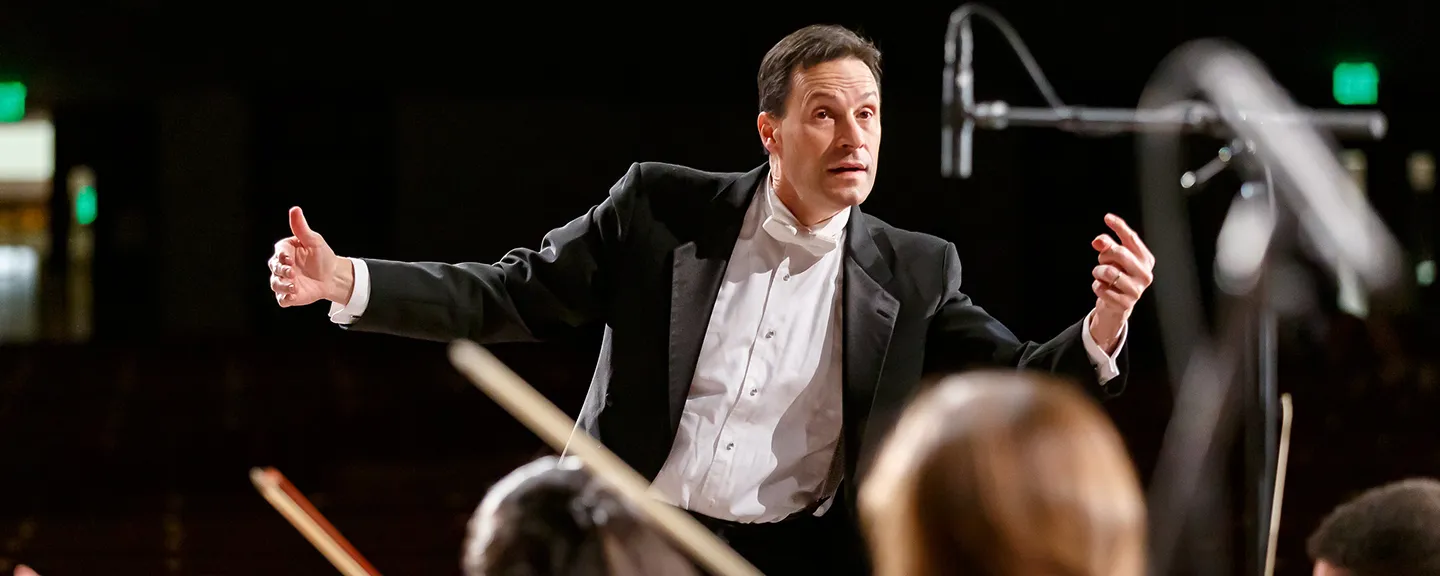- Home
- >
- APU Articles
- >
- News Article
Earning a Master’s Degree in Music While Studying Under a Mentor
March 31, 2020 | Written By Ana Felce

Azusa Pacific University’s Master of Music programs have a strong basis in mentorship education to increase student success. Here’s some insight into how completing a master’s degree in music with an apprenticeship approach to learning can prepare you for your music career.
Mentor-Based Learning Comes in Many Forms
John E. Simons, DMA, professor of music and associate dean of graduate studies for APU’s School of the Arts, noted that mentor-based learning helps develop students into artists and can greatly affect how graduates enter the professional music field after their time on campus.
For example, Simons explained that all Master of Music students work with professional musicians in one-on-one lessons. They also gather with other graduate students (and a master teacher) for peer learning and performing experiences each week. Through these practice methods, students learn from each other and benefit from the guidance of those who are more experienced—all while using the latest technology, facilities, and resources available.
There’s also a focus on paying it forward. Graduate students at APU are encouraged to become mentors to undergraduate students, working as tutors and assistant teachers in undergraduate music classes and ensembles. This allows them to further develop their learning, hone their craft, and contribute to the formation of future musicians and mentors.
How a Mentorship Helps Prepare You for Your Career
At APU, students use what they learn from their master’s programs, along with the support from a mentor, to develop both the technical and interpersonal skills they need to succeed in the music industry. Simons stressed the importance this plays in the long term.
“It is critical for a graduate student to be not only a high-level artist, but also a musician who works with others and can meet artistic deadlines,” Simons said.
In fact, many of APU’s music faculty also orchestrate and compose music for the film industry, and share insights from these experiences with their students. This added depth helps students develop the skills needed to flourish as professional artists, and can create introductions with networks and organizations in need of musicians.
Form Connections That Lead to Incredible Opportunities
Many students have achieved great success after earning a graduate degree from Azusa Pacific’s School of Music, thanks to both the rigorous master’s programs and the support of their mentors. Diego Barbosa-Vásquez and Adam Hollick are two alumni with budding music careers—and both of them are making great strides toward becoming influential figures.
Barbosa-Vásquez is a recent graduate from the School of Music at APU. He was named ambassador of Colombia Country Brand and professional member by ProColombia as well as opera and orchestra conductor of the League of American Orchestras. Additionally, he was awarded a doctoral fellowship to earn a Doctor of Musical Arts (DMA) degree at Indiana University’s Jacobs School of Music, where he’ll continue to develop his skills.
Fellow APU graduate Hollick started his own career with regional opera and musical theater jobs, plus acting jobs in television. He’s excelled in his career and had a number of opportunities in the entertainment industry, including a role in NCIS: Los Angeles and the lead role in Adventures of Aladdin.
These are just two of the many stories of graduate students who come to APU, excel with a master teacher, and go on to reach high levels of success. APU music programs prepare students with the academic rigor and support that sets them apart in the future.
Interested in enhancing your own career in music with the support and network that APU offers? Discover more about APU’s School of Music and the master’s programs offered for aspiring composers, conductors, and performers.